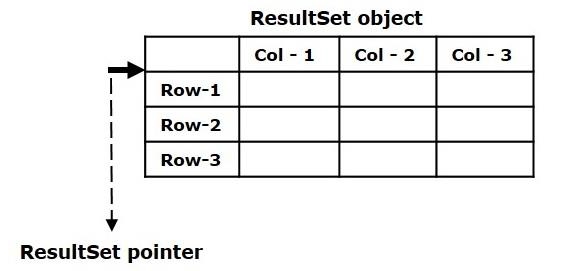
 Data Structure
Data Structure Networking
Networking RDBMS
RDBMS Operating System
Operating System Java
Java MS Excel
MS Excel iOS
iOS HTML
HTML CSS
CSS Android
Android Python
Python C Programming
C Programming C++
C++ C#
C# MongoDB
MongoDB MySQL
MySQL Javascript
Javascript PHP
PHP
- Selected Reading
- UPSC IAS Exams Notes
- Developer's Best Practices
- Questions and Answers
- Effective Resume Writing
- HR Interview Questions
- Computer Glossary
- Who is Who
Java ResultSet isClosed() method with example
When we execute certain SQL queries (SELECT query in general) they return tabular data.
The java.sql.ResultSet interface represents such tabular data returned by the SQL statements.
i.e. the ResultSet object holds the tabular data returned by the methods that execute the statements which quires the database (executeQuery() method of the Statement interface in general).
The ResultSet object has a cursor/pointer which points to the current row. Initially this cursor is positioned before first row.

The isClosed() method of the ResultSet interface is used to determine whether the current ResultSet object is closed.
rs.isclosed()
CLOSE_CURSORS_AT_COMMIT
If the holdability of the ResultSet object is set to this value. Whenever you commit/save a transaction using the commit() method of the Connection interface, the ResultSet objects created in the current transaction (that are already opened) will be closed.
Let us create a table with name MyPlayers in MySQL database using CREATE statement as shown below −
CREATE TABLE MyPlayers( ID INT, First_Name VARCHAR(255), Last_Name VARCHAR(255), Date_Of_Birth date, Place_Of_Birth VARCHAR(255), Country VARCHAR(255), PRIMARY KEY (ID) );
Now, we will insert 7 records in MyPlayers table using INSERT statements −
insert into MyPlayers values(1, 'Shikhar', 'Dhawan', DATE('1981-12-05'), 'Delhi', 'India');
insert into MyPlayers values(2, 'Jonathan', 'Trott', DATE('1981-04-22'), 'CapeTown', 'SouthAfrica');
insert into MyPlayers values(3, 'Kumara', 'Sangakkara', DATE('1977-10-27'), 'Matale', 'Srilanka');
insert into MyPlayers values(4, 'Virat', 'Kohli', DATE('1988-11-05'), 'Delhi', 'India');
insert into MyPlayers values(5, 'Rohit', 'Sharma', DATE('1987-04-30'), 'Nagpur', 'India');
insert into MyPlayers values(6, 'Ravindra', 'Jadeja', DATE('1988-12-06'), 'Nagpur', 'India');
insert into MyPlayers values(7, 'James', 'Anderson', DATE('1982-06-30'), 'Burnley', 'England');
Following JDBC program sets the holdability value to CLOSE_CURSORS_AT_COMMIT starts a transaction by disabling the auto-commit, retrieves the contents of a table named MyPlayers to a ResultSet object, inserts a new row into the ResultSet (as well as the table) and commits the transaction.
After committing the transaction, you can verify whether the ResultSet object retrieved during the transaction is closed or, held open using the isClosed() method.
If you do so since we have set the ResultSet holdability to CLOSE_CURSORS_AT_COMMIT, you can find that the ResultSet object rs is closed after the transaction is saved/committed.
Example
import java.sql.Connection;
import java.sql.Date;
import java.sql.DriverManager;
import java.sql.ResultSet;
import java.sql.SQLException;
import java.sql.Statement;
public class ResultSetHoldability_CloseCursorsAtCommit {
public static void main(String args[]) throws SQLException {
//Registering the Driver
DriverManager.registerDriver(new com.mysql.jdbc.Driver());
//Getting the connection
String url = "jdbc:mysql://localhost/mydatabase";
Connection con = DriverManager.getConnection(url, "root", "password");
System.out.println("Connection established......");
//Setting the auto commit false
con.setAutoCommit(false);
//Setting the holdability to CLOSE_CURSORS_AT_COMMIT
con.setHoldability(ResultSet.CLOSE_CURSORS_AT_COMMIT);
//Creating a Statement object
Statement stmt = con.createStatement(ResultSet.TYPE_SCROLL_SENSITIVE, ResultSet.CONCUR_UPDATABLE);
//Retrieving the data
ResultSet rs = stmt.executeQuery("select * from MyPlayers");
System.out.println("Contents of the table");
while(rs.next()) {
System.out.print("ID: "+rs.getString("ID")+", ");
System.out.print("First_Name: "+rs.getString("First_Name")+", ");
System.out.print("Last_Name: "+rs.getString("Last_Name"));
System.out.print("Date_Of_Birth: "+rs.getString("Date_Of_Birth")+", ");
System.out.print("Place_Of_Birth: "+rs.getString("Place_Of_Birth"));
System.out.print("Country: "+rs.getString("Country"));
System.out.println("");
}
//Inserting a new row
rs.moveToInsertRow();
rs.updateInt(1, 8);
rs.updateString(2, "Ishant");
rs.updateString(3, "Sharma");
rs.updateDate(4, new Date(904694400000L));
rs.updateString(5, "Delhi");
rs.updateString(6, "India");
rs.insertRow();
//Committing the transaction
con.commit();
boolean bool = rs.isClosed();
if(bool) {
System.out.println("ResultSet object is closed");
} else {
System.out.println("ResultSet object is open");
}
}
}
Output
Connection established...... Contents of the table ID: 1, First_Name: Shikhar, Last_Name: DhawanDate_Of_Birth: 1981-12-05, Place_Of_Birth: DelhiCountry: India ID: 2, First_Name: Jonathan, Last_Name: TrottDate_Of_Birth: 1981-04-22, Place_Of_Birth: CapeTownCountry: SouthAfrica ID: 3, First_Name: Kumara, Last_Name: SangakkaraDate_Of_Birth: 1977-10-27, Place_Of_Birth: MataleCountry: Srilanka ID: 4, First_Name: Virat, Last_Name: KohliDate_Of_Birth: 1988-11-05, Place_Of_Birth: MumbaiCountry: India ID: 5, First_Name: Rohit, Last_Name: SharmaDate_Of_Birth: 1987-04-30, Place_Of_Birth: NagpurCountry: India ID: 6, First_Name: Ravindra, Last_Name: JadejaDate_Of_Birth: 1988-12-06, Place_Of_Birth: NagpurCountry: India ID: 7, First_Name: James, Last_Name: AndersonDate_Of_Birth: 1982-06-30, Place_Of_Birth: Burnley Country: England ResultSet object is closed

